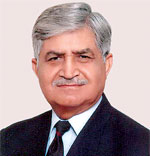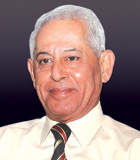- Prime Minister Narendra Modi inaugurates Aero India 2023 in Bengaluru; Releases Commemorative Stamp
- Defence Secretary meets delegations from Saudi Arabia, USA and Oman on the sidelines of Aero India 2023
- Foreign Ministers of 32 countries to attend Aero India 2023
- Embraer showcases the C-390 Millennium at Aero India 2023
Can India afford to ‘chill-out’ about China?
With a trade corridor that flouts India’s sovereignty in full swing and wounds of Doklam still fresh, former Army Chief General V.P. Malik and former Chief of the Air Staff Air Chief Marshal Fali Homi Major interpret the Sino advances on Indo turf.
The recent violation of Indian airspace by China isn’t a first nor does it seem to be the last. A 73-day military face off at Doklam last year at the behest of Bhutan that involved soldiers from the two sides throwing punches and stones at each other, and the frequent appearances of Chinese attack submarines in the Indian Ocean has got the nation on its tenterhooks.
With the recent military budget allocation being the lowest since 1962 (also the year of Sino-Indian war, an ominous date indeed), many are concerned if we can afford to ‘chill-out’ about China?
HOPE SPRINGS ETERNAL
“No, we can’t afford to ‘chill out’ but we shouldn’t put China on a pedestal. It’s not 12 ft tall and I think given the capabilities of our armed forces coupled with good diplomacy, China doesn’t seem to a problem to me,” says former Air Chief Marshal Fali Homi Major. And he isn’t alone either. Serving Chief of Army Staff General Bipin Rawat has also recently stated that the Indian Army can maintain preparedness and its active operational activities within the budget that has been allocated for the armed forces.
On that note, the annual India-China military exercise will also resume this year after being shelved due to tensions last year. India is also being extra cautious to appease the dragon vis-à-vis Tibet. Recently senior government officials were instructed not to attend the “Thank You India” event organised by the Tibetan government-in-exile marking 60 years of political asylum in India. Reportedly, the Tibetan spiritual and religious leader, His Holiness Dalai Lama also cancelled an upcoming visit to the Indian border state of Sikkim - a region that China claims is part of Tibet, lest it offended China. While many officials maintain that Indo-Tibet relationship is ‘very little political but more spiritual, religious and cultural’, the Prime Minister’s upcoming China visit may be the reason behind the move.

“I am definitely not asking for a war or any sort of war mongering but if the situation is likely to escalate, we need to be pre-pared for it,” says former Army Chief General V.P. Malik
“These are just nuances of diplomacy. Like I know that the Prime Minister is supposed to go to SCO summit, then our defence minister and even foreign minister will be visiting China. So, there are a number of events coming up in the next few months where there will be exchanges at a very senior level and probably that’s the reason why the Ministry of External Affairs (MEA) doesn’t want to create a situation which can fizzle out the major changes that can take place. I wouldn’t like to pass any judgment but if the Ministry of External Affairs has passed these instructions, it must be for a valid reason,” reasons General Ved Prakash Malik, who also served as Army Chief during the Kargil War.
CROUCHING TIGER, NOT-SO-HIDDEN DRAGON
However, China’s advances cannot be taken lightly either. Former Army Chief General Ved Prakash Malik agrees. He says, “China has started asserting itself militarily on all its fronts whether it is South China Sea or unresolved Indo-Tibet and Indo-China borders. What’s worrisome is that whatever they think belongs to them, they are becoming more and more assertive about it. They may not want to start a war at these places but inching forward is what we have seen along our borders. So, with their aggressive patrolling, trying to inch forward, we have to be really alert around the borders.”
Not only militarily, but economically too China is making no bones about irking India. Its ambitious Belt and Road Initiative (BRI) that seeks to rebuild the China’s old Silk Road trade routes bypasses India, apart from a corner of the disputed Pakistan occupied Kashmir (PoK) region but involves the neighbouring Sri Lanka, Nepal and the Maldives, with the exception of Bhutan. India’s bone of contention is not as much the cold shoulder from the initiative but the fact that it passes through the PoK and even boycotted last year’s Belt and Road Forum organised by China. The MEA also issued a statement on its objections on mainly three grounds - the corridor includes projects in lands belonging to India, the initiative risks running smaller countries into huge debts and could destroy the ecology as well as disrupt local communities.

“We shouldn’t put China on a pedestal. It’s not 12 ft tall and I think given the capabilities of our armed forces coupled with good diplomacy, China doesn’t seem to a problem to me,” says former CAS Air Chief Marshal Fali Homi Major
However, in spite of apprehensions, government attendees at the upcoming SCO meet are expected to tactically refrain from opposing BRI as well as the China-Pakistan Economic Corridor (CPEC).
BUDGET TROUBLE
Despite General Bipin Rawat’s reassurances, the fact remains that the defence budget is inadequate to counter hostile neighbouring countries. Minister of State for Defence Subhash Bhamre also mentioned the same in a written reply that the current budgetary allocation was around 76,765 crore less than what the forces sought.
General V.P. Malik says, “Any serving army chief has to say things like this. Even during Kargil war when we had lots of deficiencies, I had also said that we will fight with what we have. So, you cannot wrong him (General Rawat) on that. The fact is that today we know that there are a large number of deficiencies and our modernisation has been lacking. These indications were given by Vice Chief Lt General Sarath Chand...even minister Subhash Bhamre has spoken about the same in a letter. The point is that we are weak today on two major issues-the infrastructure, particularly around the northern borders and secondly, deficiencies and lack of modernisation. Both these things require money and therefore a large number of us feel that the budget is inadequate.”
According to General Malik, the budget may hit the government’s ambitious ‘Make in India’ project too with the lack of capital not attracting enough companies. He also suggests that the army, navy and air force also amp up their savings to be used for modernisation. He says, “I am definitely not asking for a war or any sort of war mongering but if the situation is likely to escalate, we need to be prepared for it. When we are looking to ‘Make in India’, the private or any other sector wants to see how much capital do we have. If we don’t have that what kind of orders can they expect from the Ministry of Defence? So, it is essential, I believe to give them more money as well as save money within the Armed Forces, all three forces, to the extent that it’s possible. And, that saving should also go into the modernisation kitty, not anywhere else.”





